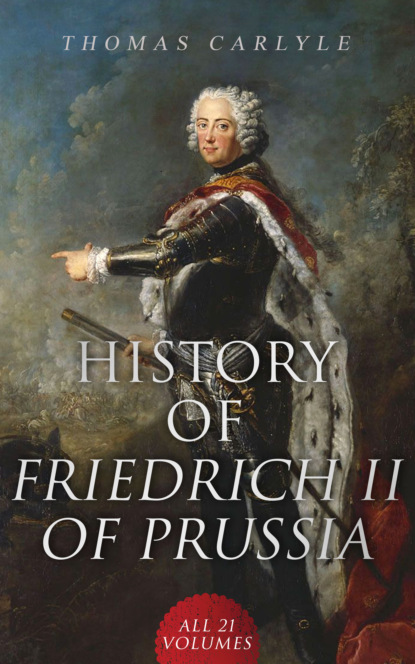yet much "given to blush" withal (which is a feature of him), shall go with us; much more, Sophie Charlotte our august Electress-Queen that is to be: and we set out, on the 17th of December, 1700, last year of the Century; "in 1800 carriages:" such a cavalcade as never crossed those wintry wildernesses before. Friedrich Wilhelm went in the third division of carriages (for 1800 of them could not go quite together); our noble Sophie Charlotte in the second; a Margraf of Brandenburg-Schwedt, chief Margraf, our eldest Half-Brother, Dorothee's eldest Son, sitting on the coach-box, in correct insignia, as similitude of Driver. So strict are we in etiquette; etiquette indeed being now upon its apotheosis, and after such efforts. Six or seven years of efforts on Elector Friedrich's part; and six or seven hundred years, unconsciously, on that of his ancestors.
The magnificence of Friedrich's processionings into Konigsberg, and through it or in it, to be crowned, and of his coronation ceremonials there: what pen can describe it, what pen need! Folio volumes with copper-plates have been written on it; and are not yet all pasted in bandboxes, or slit into spills. [British Museum, short of very many necessary Books on this subject, offers the due Coronation Folio, with its prints, upholstery catalogues, and official harangues upon nothing, to ingenuous human curiosity.] "The diamond buttons of his Majesty's coat [snuff-colored or purple, I cannot recollect] cost 1,500 pounds apiece;" by this one feature judge what an expensive Herr. Streets were hung with cloth, carpeted with cloth, no end of draperies and cloth; your oppressed imagination feels as if there was cloth enough, of scarlet and other bright colors, to thatch the Arctic Zone. With illuminations, cannon-salvos, fountains running wine. Friedrich had made two Bishops for the nonce. Two of his natural Church-Superintendents made into Quasi-Bishops, on the Anglican model—which was always a favorite with him, and a pious wish of his;—but they remained mere cut branches, these two, and did not, after their haranguing and anointing functions, take root in the country. He himself put the crown on his head: "King here in my own right, after all!"—and looked his royalest, we may fancy; the kind eyes of him almost partly fierce for moments, and "the cheerfulness of pride" well blending with something of awful.
In all which sublimities, the one thing that remains for human memory is not in these Folios at all, but is considered to be a fact not the less: Electress Charlotte's, now Queen Charlotte's, very strange conduct on the occasion. For she cared not much about crowns, or upholstery magnificences of any kind; but had meditated from of old on the infinitely little; and under these genuflections, risings, sittings, shiftings, grimacings on all parts, and the endless droning eloquence of Bishops invoking Heaven, her ennui, not ill-humored or offensively ostensible, was heartfelt and transcendent. At one turn of the proceedings, Bishop This and Chancellor That droning their empty grandiloquences at discretion, Sophie Charlotte was distinctly seen to smuggle out her snuff-box, being addicted to that rakish practice, and fairly solace herself with a delicate little pinch of snuff. Rasped tobacco, tabac rape, called by mortals rape or rappee: there is no doubt about it; and the new King himself noticed her, and hurled back a look of due fulminancy, which could not help the matter, and was only lost in air. A memorable little action, and almost symbolic in the first Prussian Coronation. "Yes, we are Kings, and are got SO near the stars, not nearer; and you invoke the gods, in that tremendously long-winded manner; and I—Heavens, I have my snuff-box by me, at least!" Thou wearied patient Heroine; cognizant of the infinitely little!—This symbolic pinch of snuff is fragrant all along in Prussian History. A fragrancy of humble verity in the middle of all royal or other ostentations; inexorable, quiet protest against cant, done with such simplicity: Sophie Charlotte's symbolic pinch of snuff. She was always considered something of a Republican Queen.
Thus Brandenburg Electorate has become Kingdom of Prussia; and the Hohenzollerns have put a crown upon their head. Of Brandenburg, what it was, and what Prussia was; and of the Hohenzollerns and what they were, and how they rose thither, a few details, to such as are dark about these matters, cannot well be dispensed with here.
END OF BOOK I
Volume 02
BOOK II. — OF BRANDENBURG AND THE HOHENZOLLERNS. - 928-1417.
Chapter I. — BRANNIBOR: HENRY THE FOWLER.
Chapter II. — PREUSSEN: SAINT ADALBERT.
Chapter III. — MARKGRAVES OF BRANDENBURG.
END OF THE FIRST SHADOWY LINE.
SUBSTANTIAL MARKGRAVES: GLIMPSE OF THE CONTEMPORARY KAISERS.
Chapter IV. — ALBERT THE BEAR.
Chapter V. — CONRAD OF HOHENZOLLERN; AND KAISER BARBAROSSA.
CONRAD HAS BECOME BURGGRAF OF NURNBERG (A.D. 1170) .
OF THE HOHENZOLLERN BURGGRAVES GENERALLY.
Chapter VI. — THE TEUTSCH RITTERS OR TEUTONIC ORDER.
HEAD OF TEUTSCH ORDER MOVES TO VENICE.
TEUTSCH ORDER ITSELF GOES TO PREUSSEN.
THE STUFF TEUTSCH RITTERS WERE MADE OF. CONRAD OF THURINGEN: SAINT ELIZABETH; TOWN OF MARBURG.
Chapter VII. — MARGRAVIATE OF CULMBACH: BAIREUTH, ANSPACH.
BURGGRAF FRIEDRICH III.; AND THE ANARCHY OF NINETEEN YEARS.
KAISER RUDOLF AND BURGGRAF FRIEDRICH III.
Chapter VIII. — ASCANIER MARKGRAVES IN BRANDENBURG.
MARKGRAF OTTO IV., OR OTTO WITH THE ARROW
Chapter IX. — BURGGRAF FRIEDRICH IV.
CONTESTED ELECTIONS IN THE REICH: KAISER ALBERT I.; AFTER WHOM SIX NON-HAPSBURG KAISERS.
